Mozambique: Wounds, latent tension mark 50 years of independence - CC President
Mozambique: Proposal for Gaza register audit; 27 parties standing – Hanlon
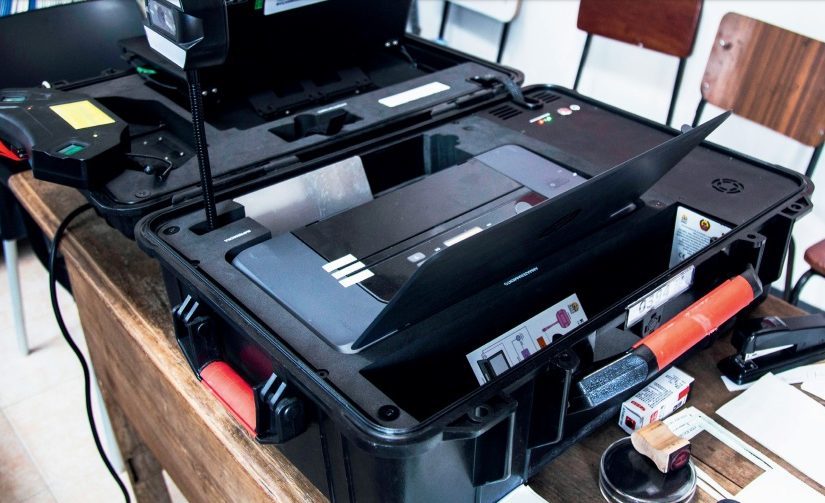
Picture: ADS
CIP proposes Gaza registration audit
An audit of the Gaza electoral register is proposed by the Public Integrity Centre (CIP, publishers of this Bulletin) and on 12 August CIP asked the National Elections Commission for access to the registration data base to carry out the audit.
The national population census carried out by the National Statistics Institute (Instituto Nacional de Estatistica, INE) in 2017 with extensive technical support by donors says that there are currently 836,581 voting age adults in Gaza, while the National Elections Commission (Comissao Nacional de Eleicoes, CNE) and its technical secretariat (Secretariado Tecnico de Administracao Eleitoral, STAE) said they registered 1,166,011 voters in Gaza. This 329,430 extra voters could make a difference in the 15 October presidential elections. If extra votes largely went to Nyusi and Frelimo, it could be enough to make a 2nd round unnecessary.
Speaking to donors on 4 August, CNE head Sheik Abdul Carimo said the CNE was confident about its registration and saw no reason to do an audit, and in any case does not have the money. But he invited donors to do the audit if they thought it necessary.
CIP has commitments of sufficient money and a US and a European company have both tendered to do the job, which could be completed in less than two weeks – quickly enough to prevent disrupting the October election. To register, voters must provide fingerprints and the main test would to compare fingerprints in the data base to look for duplications or to look for voters registered without fingerprints. If the CNE provides access to the Gaza data base, this could be done rapidly. In many countries, fingerprint comparison is done by electoral authorities as part of the registration process to prevent multiple registration. The companies that have tendered have done this job in Nigeria, Ghana, Kenya, Yemen and elsewhere.
CIP has asked for the data as a domestic observer group, and the law grants extensive access to both domestic and international observers. In addition the registration law requires that all registration data be deposited in the National Archive, which means it is open to the public. (However the archive confirms it has never received registration data, even though required by law.)
27 parties and coalitions standing; 4 presidential candidates approved
Long ballot papers will be required in general elections on 15 October with 24 parties and 2 coalitions contesting seats in the national parliament (AR); 11 parties are standing in all 11 provinces and 15 in only some provinces. Three provinces will have lists of 25 parties, while the shortest lists will be 19 parties. One party is standing only in provincial elections.
Four presidential candidates have been approved and three rejected.
Full lists have not been published for provincial assemblies and governors, but it appears that 7 parties are standing for some provincial assemblies; one (PAHUMO) is standing only for one provincial assembly and not national parliament.
Three elections take place on 15 October: President of Mozambique, national parliament (Assembleia da Republica, AR) where the constituencies are provinces, and 10 provincial assemblies (not Maputo city). In the provinces there will be two lists but just one vote (which is then applied to both lists) – district constituency lists for 85% of seats and a province wide list for 15%, and the head of the province-wide list with the most votes becomes governor.
There are a pair of single seats in the AR reserved for voters in Africa and in Europe. Frelimo, PARENA, PMJRD, PVM, UE, AMUSI, PT, PANAOC and UM are standing for both of them; Renamo is standing only in Europe.
11 parties standing for AR in all provinces
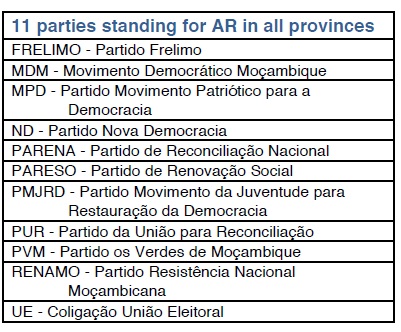
FRELIMO – Partido Frelimo
MDM – Movimento Democratico Mocambique
MPD – Partido Movimento Patriotico para a Democracia
ND – Partido Nova Democracia
PARENA – Partido de Reconciliacao Nacional
PARESO – Partido de Renovacao Social
PMJRD – Partido Movimento da Juventude para Restauracao da Democracia
PUR – Partido da Uniao para Reconciliacao
PVM – Partido os Verdes de Mocambique
RENAMO – Partido Resistencia Nacional Mocambicana
UE – Coligacao Uniao Eleitoral
15 parties to stand for AR in some provinces
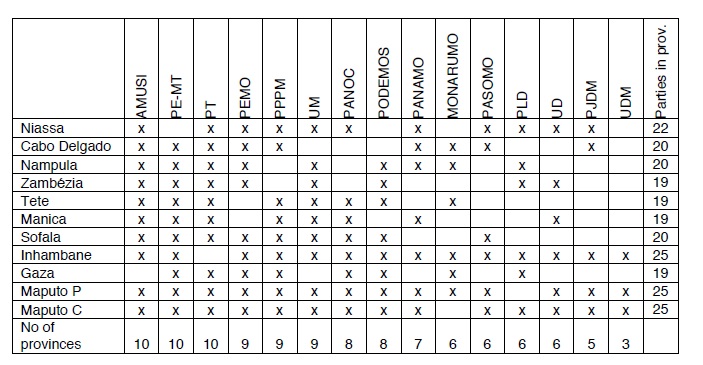
AMUSI – Partido Acção de Desenvolvimento Unido para a Salvação Integral
MONARUMO – Partido Nacional para a Recuperação da Unidade Moçambican
PAHUMO – Partido Humanitário de Moçambique
PANAMO – Partido Nacional Moçambicano
PANAOC – Partido Nacional dos Operários e Camponeses
PASOMO – Partido de Ampliação Social
PE-MT – Partido Ecologista Movimento da Terra
PEMO – Partido Ecológico de Moçambique
PJDM – Partido de Justiça Democrática de Moçambique
PLD – Partido de Liberdade e Democracia
PODEMOS – Partido Povo Optimista para o Moçambique
PPPM – Partido do Progresso do Povo de Moçambique
PT – Partido Trabalhista
UD – Coligação União Democrática
UDM – Partido da União dos Democratas de Moçambique
UM – Partido da União para a Mudança
7 parties in provincial elections
Parties standing for provincial assemblies are approved by provincial elections commissions, and that list remains incomplete. But 7 parties are known to be standing:
Frelimo, MDM and Renamo are standing in all provinces.
Standing in 2 provinces are PARENA (Sofala and Maputo prov) and PARESO (Inhambane and Maputo prov).
Standing in only one province are AMUSI (Nampula) and PAHUMO (Cabo Delgado).
13 parties not standing
Thirteen parties which registered with the National Elections Commission did not submit candidates lists and are not standing:
Partido de Reconciliação de Moçambique – PAREDE;
Coligação Aliança Democrática – CAD;
Partido para o Desenvolvimento de Moçambique – PDM;
Partido União Nacional Moçambicana – UNAMO;
Partido Congresso dos Democratas Unidos – CDU;
Partido Aliança Independente de Moçambique – ALIMO;
Frente Democrática Unida – UDF;
Movimento de Reconciliação de Moçambique – MRM;
Partido Central de Moçambique – PCM;
Partido de Solidariedade e Liberdade – PAZS;
Movimento Alternativo de Moçambique – MAMO;
Juntos pela Cidade – JPC;
Partido Popular Democrático Moçambique – PPD.
Six of these minor parties attempted to submit their nomination papers to CNE after the deadline, and were rejected. Parties had been given a month – from 2 July to 15.30 on 1 August – to submit the paperwork for their candidates and the six which arrived after 15.30 on 1 August or the next day were not allowed to submit.
Tiny votes
AIM has published the votes in 2014 of some of these small parties.
The largest of the tiny votes went to Pasono (0.23%), MJRD (0.19%), PVM (0.16%), Monarumo (0.16%), PEC-MT (0.15%), and Pareso (0.13%).
Parena, MPD, PLD, and UE all gained 0.1%.
And at the smallest end: Panaoc (0.09%), PT (0.07%), UM (0.06%), and PPPM (0.05%).
4 presidential candidates approved; 3 rejected due to fake signatures
Each presidential candidate must present 10,000 notarised signatures to the Constitutional Council (CC). On 31 July the CC accepted four candidates but rejected three because the signatures presented were false.
Accepted were candidates of the three main parties – Filipe Nyusi (Frelimo), Ossufo Momade (Renamo) and Daviz Simango (MDM), as well as one small party candidate, Mario Albino of AMUSI, a Nampula-based party that broke away from MDM. The order of the candidates on the ballot paper (based on a draw by the CC) will be Nyusi, Simango, Momade and Albino.
Rejected were candidacies of Alice Mabota, former head of the Human Rights League standing for CAD, Helder Mendonça of Podemos, and Eugenio Estevao, General Secretary of MAMO. The CC notified the three candidates of irregularities on 23 July and they had seven days to produce enough valid signatures, but they failed.
Numbers were only given by the CC for rejected candidates and not for accepted ones. The CC pointed to “blatant evidence that signatures had been signed by the same hand” and in some cases “proponent voter registration cards displaying a numerical sequence of voter cards, which leads to the assumption that they are merely copies of voter registration books.”
Alice Mabota initially had 688 signatures by the same person, 1091 people who signed her forms more than once, and 4,164 with invalid or impossible registration numbers. She then submitted 3,139 new signatures, of which 2,281 were false or invalid.
Helder Mendonça submitted 12,250 signatures of which 4,147 were invalid. He submitted just enough to fill the gap, but most were invalid.
Eugenio Estevao submitted 11,340 signatures of which 7,732 were invalid, including 5,360 clearly signed by the same person. He then submitted 6,393 new signatures, of which 311 were signed by the same person and 4,434 had invalid registration card numbers.
http://www.cconstitucional.org.mz/Eleicoes-2019
Frelimo lawyers also make mistakes
Electoral decisions are often dependent on tiny and obscure details of the electoral laws and party lawyers must be experts. But, sometimes, even Frelimo gets it wrong.
In rewriting the provincial election laws, Frelimo removed the requirement that candidates for provincial governor had to be on the electoral role for that province. Thus Frelimo has put forward three existing governors as heads of lists (and thus candidates for governor) in other provinces. Clearly they are registered in their current province.
But Renamo on 8 August pointed out that Frelimo had not changed the clause in the law that requires a candidate for governor to be resident in the province (even if not on the electoral role), and that four candidates for governor are not resident in those provinces. They are:
- Julio Parruque. standing for governor of Maputo province, but now governor of Cabo Delgado.
- Francisca Tomas, standing for governor of her home province of Manica, but now governor of Niassa.
- Manuel Rodrigues, standing for governor in Nampula, but now governor of Manica.
- Judite Massangele, standing for governor of Niassa, but registered in Cabo Delgado or Nampula.
After initially denying any problem, Frelimo appears to have accepted the point, and on 16 August President Nyusi announced that the three governors had been allowed to resign. This will allow them to move to the new provinces where they are standing, and become resident.
CNE members continue
Parliament on 30 July extended the terms of 9 CNE members to 30 April 2020, with Frelimo and MDM voting in favour and Renamo opposed.
Because of a Renamo boycott, 8 Frelimo and Frelimo-aligned members and 1 MDM member took office in 2013 and their term expired in April this year. Parliament extended their term to match those of Renamo members only appointed in 2014.
By Joseph Hanlon


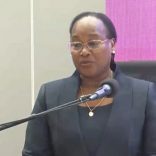
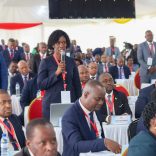

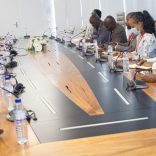
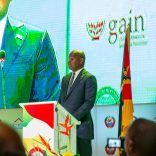





Leave a Reply
Be the First to Comment!
You must be logged in to post a comment.
You must be logged in to post a comment.